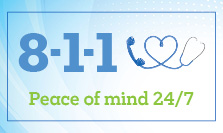Protecting Your Newborn Baby From Whooping Cough (Pertussis)
What is Pertussis?
Pertussis, also known as whooping cough, is a serious infection of the lungs and upper airway that is caused by a bacteria. The pertussis bacteria can be present in the nose and throat of people of all ages. It is spread easily by coughing, sneezing and close contact.
What are the symptoms of Pertussis?
Pertussis starts with cold-like symptoms including a runny nose, low fever, coughing, and sneezing. Within 1 to 2 weeks the cough becomes severe and occurs in coughing spells (whooping sound) and can cause the person to gag or vomit due to the thick mucus being produced. It can be difficult to breathe. The cough lasts several weeks and is often worse at night.
How common is Pertussis?
Outbreaks of Pertussis occur every 3 to 4 years with numerous outbreaks occurring across Canada including PEI. Seventy- percent of admissions to hospital are infants younger than 4 months of age.
Why is Pertussis (Whooping Cough) dangerous to your baby?
Infants who have not started or completed their routine immunization are at most risk. Newborns are too young to receive the vaccine and they do not get adequate protection until they have received four doses of vaccine by 18 months of age. Young children, especially infants can become extremely ill from whooping cough and develop serious complications such as pneumonia, convulsions, difficulty breathing, and permanent brain damage. Infants can die from pertussis even if they are treated with antibiotics or cared for in hospital.
Who should be immunized?
All pregnant women should receive Pertussis-containing vaccine (Tdap) in every pregnancy, irrespective of prior immunization history. Encourage your baby’s other parent(s), siblings, grandparents and any other close caregivers to be immunized.
Why should pertussis-containing vaccine be offered to pregnant women?
Getting the Pertussis-containing vaccine when you are pregnant is the best way to protect your newborn from getting whooping cough until the baby is old enough to start receiving the vaccine starting at 2 months of age. Studies have shown that 9 out of 10 infants under 3 months of age are protected when the mother is vaccinated during pregnancy.
Is the vaccine safe during pregnancy?
The vaccine is safe for the mother and her fetus. The most common side effects are reactions at the injection site (redness, swelling, tenderness). Less common side effects may include fever, chills and headache.
The Pertussis vaccine is now recommended in every pregnancy, ideally between 27 and 32 weeks. Please call your local Public Health Nursing office early in your pregnancy to book an appointment. Getting the vaccine before 32 weeks allows for the most protection to be passed from the mother to the baby. However, it is still a benefit to get the vaccine after 32 weeks until birth of your baby.
If you are not vaccinated during pregnancy you will be offered the vaccine before you leave the hospital. The vaccine is safe for breastfeeding mothers.
How can you protect your newborn baby from Pertussis?
To protect your newborn, all those who will be in close contact with your baby should be immunized before your baby is born. They should make appointments at the Public Health Nursing office in your community to receive the vaccine. Your baby will be less likely to become ill from pertussis if those around him/her are immunized.
When will your baby be immunized against Pertussis?
Your baby will be immunized against pertussis at the two, four and six-month visits to Public Health Clinics, and will receive a booster at 18 months. At that time, your baby will have received the best protection possible against pertussis illness.
NACI (2018) Update on Immunization in Pregnancy with Tetanus Toxoid, Reduced Diphtheria Toxoid and Reduced Acellular Pertussis (Tdap) Vaccine

